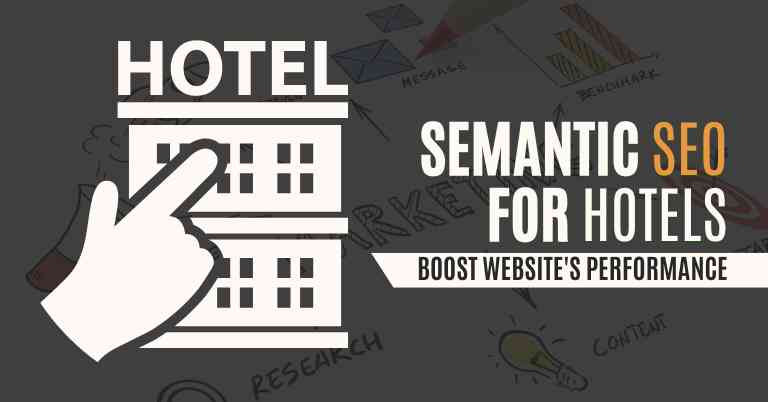Implementing entity-based optimization is crucial for hotels to improve their SEO rankings and attract more online bookings. By optimizing content for entity search, hotels can ensure that search engines understand the context and relevance of their website, resulting in higher visibility and increased organic traffic.
Entity-based SEO goes beyond traditional keyword optimization by focusing on entities and their relationships, such as hotel amenities, locations, and services. This approach allows search engines to provide more accurate and personalized search results to users. In this guide, we will explore the concept of semantic SEO for hotels and provide practical tips on how to effectively implement entity-based optimization strategies for improved search engine visibility and better user experience.
Let's See the Topic Overview
Understanding Entity-Based Optimization
What is entity-based SEO and its significance for hotels?
Entity-based SEO is a new approach to search engine optimization that goes beyond just focusing on keywords. Instead, it takes into account the context and relevance of the information being searched for. This means that search engines, like Google, are not only looking for specific words but also trying to understand the overall meaning and intention behind a search query.
For hotels, entity-based optimization is particularly significant as it allows them to provide more accurate and relevant information to potential guests. By understanding the context of a search query, hotels can create content that aligns with the user’s intent and provides them with the information they are looking for.
The role of context in entity-based optimization.
Context plays a crucial role in entity-based optimization. It helps search engines better understand the meaning behind a search query, allowing them to provide more relevant and accurate results. When it comes to hotels, context helps search engines determine the specific information users are looking for, such as hotel amenities, location, pricing, and guest reviews. By optimizing content with the right context, hotels can improve their chances of appearing in search results that match user intent.
To optimize for context, hotels can consider the following strategies:
- Understand user intent: By analyzing user behavior and search patterns, hotels can gain insights into what users are looking for and tailor their content accordingly.
- Optimize content outline: Creating a clear and structured content outline helps search engines understand the context of the information provided, making it more relevant to user queries.
- Create detailed content: Providing in-depth and comprehensive content not only enhances the user experience but also helps search engines identify the context and relevance of the information.
- Optimize for multiple keywords: Instead of relying solely on single keywords, hotels should focus on semantic keywords – related terms and synonyms – to capture a broader range of user search queries.
- Answer People Also Ask questions: Addressing commonly asked questions related to hotels not only helps users find relevant information but also signals to search engines that the content is contextually valuable.
- Follow topic clustering: Organizing content around specific topics or themes helps search engines understand the context and relevance of the information provided.
- Add structured data: Incorporating structured data markup, such as schema.org tags, provides additional context to search engines, making it easier for them to understand and display relevant information in search results.
In conclusion, entity-based optimization for hotels requires a deep understanding of user intent and the ability to provide contextually relevant information. By optimizing content with the right context, hotels can improve their visibility in search results and better meet the needs of their target audience.
Implementing Semantic Keyword Clusters
Implementing semantic keyword clusters is a crucial aspect of entity-based optimization for your hotel’s SEO strategy. By optimizing for keyword clusters, you can enhance your rankings and visibility in search engine results pages (SERPs). Keyword clustering involves grouping closely related keywords and creating content that targets these clusters strategically.
Optimizing for Keyword Clusters to Improve Rankings
Optimizing your hotel’s website content for keyword clusters can lead to significant improvements in your search engine rankings. When you focus on clusters of related keywords, you create a strong topical relevance that search engines like Google appreciate. By covering various aspects of a specific topic, you signal to search engines that your content provides valuable and comprehensive information.
Here are some essential steps to optimize for keyword clusters:
- Conduct thorough keyword research to identify relevant keywords and their variations that can be grouped into clusters.
- Create high-quality and informative content around each keyword cluster, ensuring that it addresses the specific intent of users searching for those keywords.
- Integrate the keywords naturally and strategically throughout the content, including in headings, subheadings, paragraphs, and image alt attributes.
- Ensure that the content maintains a logical flow and provides a comprehensive overview of the topic for both search engines and users.
- Include additional related terms and synonyms within the content to further enhance its semantic relevance.
- Optimize the metadata, such as meta titles and descriptions, to accurately reflect the content and capture users’ attention in the SERPs.
- Monitor the performance of your optimized content regularly and make adjustments as needed based on users’ engagement and search engine rankings.
How to Effectively Optimize for Multiple Keywords
Optimizing your hotel’s website content for multiple keywords is essential to expand your online visibility and reach a wider audience. When implementing entity-based optimization, it’s crucial to optimize your content effectively for each keyword cluster.
Here are some tips for effectively optimizing for multiple keywords:
- Group related keywords into cohesive clusters based on their semantic relevance.
- Create separate pages or sections of your website dedicated to each keyword cluster to ensure a concentrated focus on each topic.
- Develop comprehensive and detailed content that covers all aspects of each keyword cluster, answering users’ questions and addressing their search intent.
- Utilize headers and subheadings to structure your content and include the targeted keywords organically.
- Maintain a natural writing style while incorporating variations and synonyms of the targeted keywords to enhance semantic relevancy.
- Interlink your optimized content within the website to create a network of interconnected pages that boosts the overall visibility of your keyword clusters.
- Regularly update and refresh your content to stay relevant and up-to-date with the latest industry trends and changes.
By adhering to these optimization practices, you can effectively optimize your hotel’s website for multiple keywords, increasing your chances of ranking higher in search engine results and attracting more targeted organic traffic. The implementation of entity-based optimization through semantic keyword clusters provides a strategic approach to boost your hotel’s online visibility and drive more bookings and revenue.
Creating Content Outline For Semantic SEO
Creating a well-structured content outline is a crucial step in implementing Semantic SEO for hotels. This process involves understanding user intent and following best practices to ensure your content is detailed and comprehensive. By doing so, you can improve your website’s visibility, organic traffic, and overall user experience. In this section, we will explore the importance of understanding user intent in creating a content outline and discuss the best practices for creating detailed and comprehensive content.
Importance of understanding user intent in creating content outline
Understanding user intent is the foundation of an effective content outline for Semantic SEO. When you are able to align your content with what users are searching for, it increases the chances of your website appearing in relevant search results. Here are some reasons why understanding user intent is important:
- Relevance: By understanding user intent, you can ensure that your content provides the information or solution that users are looking for.
- User Experience: When your content aligns with what users want, it enhances their experience on your website and increases the chances of engagement and conversion.
- Ranking Factors: Search engines like Google prioritize content that fulfills user intent. By creating content that aligns with user intent, you have a higher chance of ranking higher in search results.
Understanding user intent allows you to tailor your content to match the different types of queries users may have, such as informational, navigational, or transactional queries. By doing so, you can provide valuable and relevant content that caters to the needs of your target audience.
Best practices for creating detailed and comprehensive content
Once you understand the user intent, it’s time to create a content outline that is detailed and comprehensive.
Here are some best practices to consider:
- Keyword Research: Conduct thorough keyword research to identify relevant keywords and phrases that align with user intent. Use tools like Google Keyword Planner or SEMrush to find keywords with high search volume and low competition.
- Structuring Content: Organize your content outline using proper heading tags, such as H1 for the main title and H2, H3, etc. for subheadings. This helps search engines understand the structure and hierarchy of your content.
- Include Subheadings and Bullet Points: Break down your content into sections and use subheadings to provide a clear structure. Within each section, use bullet points or numbered lists to highlight key points and make the content more scannable.
- In-depth Information: Provide detailed and comprehensive information related to the topic. This shows search engines that your content is authoritative and valuable to users.
- Internal and External Links: Incorporate internal and external links within your content to provide additional context and enhance the user experience. Link to related topics within your website and reputable external sources.
- Use Media: Include relevant images, infographics, videos, or other media to enhance the visual appeal and engagement of your content. Ensure that the media is optimized for fast loading times.
- Mobile Optimization: With the increasing use of mobile devices for internet browsing, ensure that your content is mobile-friendly and optimized for different screen sizes.
By following these best practices for creating detailed and comprehensive content, you can increase the chances of your content ranking higher in search results and providing value to your target audience.
Answering People Also Ask Questions
Utilizing People Also Ask (PAA) questions for semantic SEO optimization
In the world of SEO, staying ahead of the curve is crucial. One way to achieve this is by incorporating People Also Ask (PAA) questions into your content strategy. PAA questions are those related questions that appear in Google’s search results, providing users with additional information and context. By answering these questions in your content, you can improve your website’s visibility and optimize it for semantic SEO.
Strategies for including PAA questions in content
Including PAA questions in your content requires a strategic approach. Here are some strategies to help you optimize your content for semantic SEO using PAA questions:
- Research relevant PAA questions: Start by conducting keyword research to identify relevant PAA questions related to your hotel or travel niche. Tools like SEMrush or AnswerThePublic can help you discover these questions.
- Answer questions comprehensively: When answering PAA questions, be sure to provide informative and detailed responses. This will not only satisfy users’ queries but also signal to search engines that your content is authoritative and relevant.
- Utilize schema markup: Implementing schema markup can enhance the visibility of your answers in search results. By using schema markup, search engines can better understand the context and relevance of your content.
- Incorporate long-tail keywords: PAA questions often involve long-tail keywords. By including these keywords naturally in your content, you can improve your website’s visibility for specific queries.
- Follow topic clustering: Organize your content around broader topics and create clusters of related content. This approach can help search engines better understand the context of your content and improve your website’s overall visibility.
By implementing these strategies, you can maximize the benefits of answering PAA questions and optimize your content for semantic SEO. Remember to focus on providing valuable and relevant information to your audience, as this is key to earning higher search rankings and attracting organic traffic.
Leveraging Topic Clustering And Structured Data
When it comes to entity-based optimization for hotels, leveraging topic clustering and structured data is crucial for improving search visibility. By implementing these strategies, you can enhance your website’s performance and increase its chances of appearing in relevant search results. In this section, we will explore the benefits of topic clustering in entity-based optimization and how to add structured data to improve search visibility.
Benefits of Topic Clustering in Entity-Based Optimization
Topic clustering is a powerful technique that allows you to organize your website’s content around specific themes or topics. By grouping related pages together, you create a cohesive structure that search engines can easily understand. Here are some benefits of implementing topic clustering in your entity-based optimization strategy:
- Improved User Experience: Topic clustering helps users navigate your website more easily, as they can find relevant information without getting lost in unrelated content.
- Enhanced Search Relevance: By organizing your content into clusters, you signal to search engines the relevance and depth of your expertise in a particular topic, increasing the chances of ranking higher in related search queries.
- Higher Keyword Relevance: Topic clusters allow you to target multiple related keywords within a specific theme, increasing the chances of ranking for various search terms.
How to Add Structured Data to Improve Search Visibility
Structured data refers to the use of standardized formatting to provide explicit context to search engines about the content on your website. By adding structured data, you enhance your website’s visibility and help search engines understand the entities within your content. Here’s how you can add structured data to improve search visibility:
- Identify Entity Types: Determine the entities that are relevant to your hotel website, such as location, amenities, room types, and attractions nearby.
- Choose Appropriate Markup: Select the appropriate schema markup for each entity type, such as Hotel, Room, Person, or LocalBusiness.
- Implement Schema Markup: Add the structured data to your website’s HTML code, placing the relevant markup around the corresponding entity information.
- Validate and Test: Use Google’s Structured Data Testing Tool to validate and test your structured data implementation, ensuring it follows the correct syntax and provides the desired information.
- Monitor and Update: Regularly monitor your website’s structured data performance and update it as needed to ensure its accuracy and alignment with evolving standards.
By adding structured data to your hotel website, you provide search engines with valuable information about your entities, improving your chances of appearing in relevant search results. It also enhances the overall user experience, as search engines can present your content more effectively with rich snippets, carousels, or knowledge panels.
Frequently Asked Questions
How Do You Implement Semantic SEO?
To implement semantic SEO, follow these strategies:
- Optimize for keyword clusters and improve the depth and length of your content.
- Include synonyms and related terms.
- Answer people’s questions using the “People Also Ask” format.
- Add structured data to your website.
- Use content optimizer tools.
- Build topic clusters on your website.
How Do I Optimize My Content For Semantic SEO?
To optimize your content for semantic SEO, follow these best practices:
- Understand user intent and create content that addresses it.
- Focus on creating a detailed content outline.
- Use semantic keywords and optimize your content for multiple keywords.
- Answer questions that people also ask.
- Implement topic clustering and add structured data.
What Is An Example Of Semantic SEO?
An example of semantic SEO is when Google recognizes that two different long-tail keywords, such as “link building tips” and “link building techniques,” fall under the same topic of “link building. ” Semantic SEO groups similar keywords together based on their context and meaning.
What Is Entity-Based SEO?
Entity-based SEO is an approach that focuses on context rather than just keywords to help users find information. It recognizes that keywords alone do not fully reflect how humans search for content. Entity-based SEO optimizes content for relevance and uses connections between entities to improve search visibility.
Conclusion
In today’s digital landscape, implementing semantic SEO techniques is crucial for hotels to stay competitive. By understanding and optimizing for entities, hotels can improve their online visibility, attract more relevant traffic, and enhance their overall search engine rankings. By optimizing content, answering user questions, and utilizing structured data, hotels can provide a more holistic and contextually relevant online experience for their potential guests.
Embracing entity-based optimization is the new way of thinking about SEO for hotels, leading to better brand visibility and increased success in the online marketplace.












